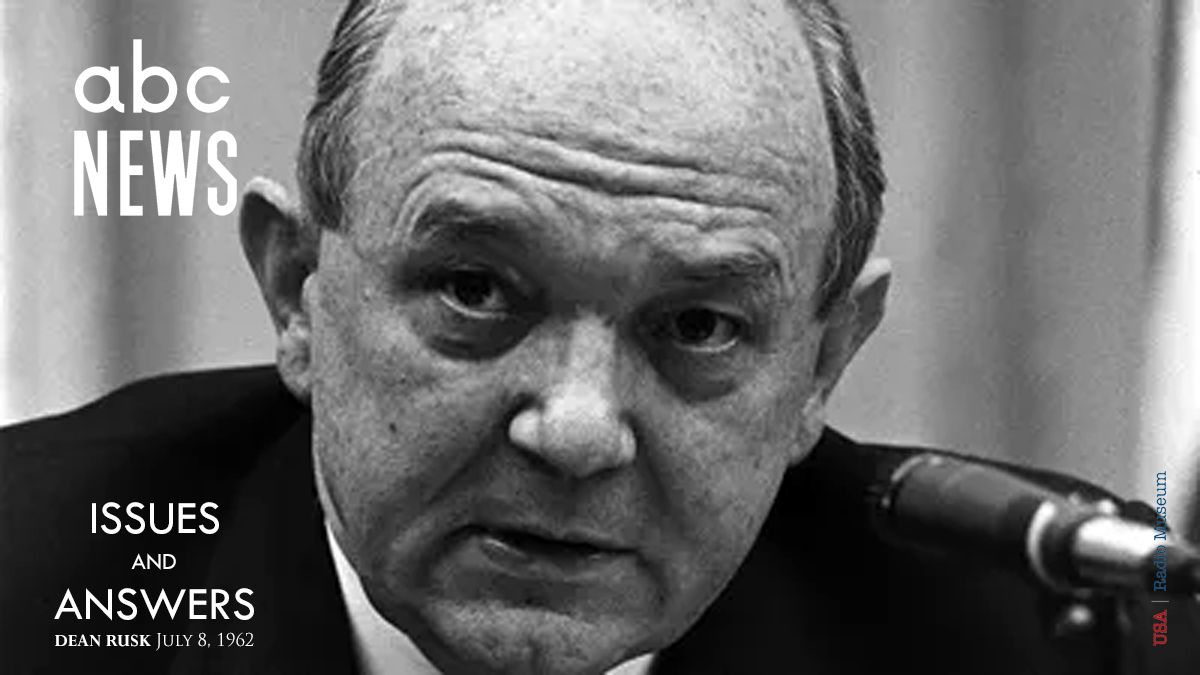Introduction Dean Rusk on the Air: 1960s Cold War Clarity from July 8, 1962 On July 8, 1962, ABC Radio’s Issues and Answers featured an inte
Introduction
Dean Rusk on the Air: 1960s Cold War Clarity from July 8, 1962
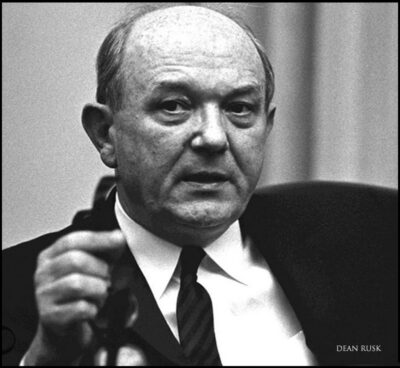 On July 8, 1962, ABC Radio’s Issues and Answers featured an interview with U.S. Secretary of State Dean Rusk, offering American listeners an unfiltered glimpse into the diplomatic mindset of Washington at the height of Cold War uncertainty. This powerful half-hour exchange—now preserved in rare audio—captures Rusk’s measured insights on some of the most pressing global issues of the day: the urgency of international nuclear inspection protocols, growing instability in Southeast Asia, and the evolving role of the United Nations as both a mediator and moral compass in world affairs.
On July 8, 1962, ABC Radio’s Issues and Answers featured an interview with U.S. Secretary of State Dean Rusk, offering American listeners an unfiltered glimpse into the diplomatic mindset of Washington at the height of Cold War uncertainty. This powerful half-hour exchange—now preserved in rare audio—captures Rusk’s measured insights on some of the most pressing global issues of the day: the urgency of international nuclear inspection protocols, growing instability in Southeast Asia, and the evolving role of the United Nations as both a mediator and moral compass in world affairs.
At the time of this broadcast, the global stage was fraught with tension. The Soviet Union and United States were locked in a race for nuclear dominance, each testing diplomatic limits while projecting military strength. Just three months later, the world would face the Cuban Missile Crisis—an event that would push humanity to the brink of nuclear confrontation. Against this backdrop, Rusk’s interview is more than policy discussion—it’s a window into high-stakes diplomacy in real time.
ABC’s Issues and Answers served as a vital conduit for public understanding during these years. Unlike many other programs, it stripped away partisan spin, allowing officials like Rusk to present America’s foreign policy strategy with clarity and gravity. His reflections underscore how media—particularly radio journalism—played a pivotal role in democratizing foreign policy dialogue, making global concerns relatable to listeners across the country.
This particular episode stands as a time capsule, documenting how the United States communicated its stance and navigated delicate international waters amid ideological conflict and geopolitical uncertainty by the early-1960s.
Setting the Scene
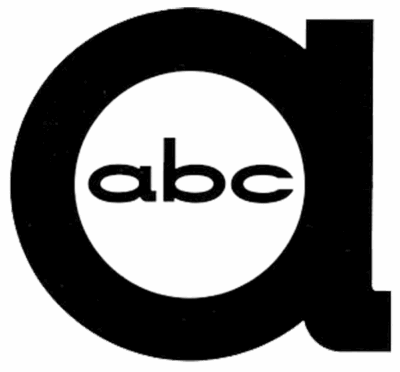 ABC’s Issues and Answers, which aired weekly from 1960 to 1981, stood as a vital pillar of American broadcast journalism at a time when Sunday public affairs programming was still finding its footing. Conceived as ABC’s strategic response to NBC’s Meet the Press and CBS’s Face the Nation, Issues and Answers carved out its own identity by maintaining a unique commitment to exclusive in-house interviews—employing only ABC News correspondents to question high-profile guests. This approach emphasized journalistic consistency, institutional credibility, and a network-led lens on national discourse.
ABC’s Issues and Answers, which aired weekly from 1960 to 1981, stood as a vital pillar of American broadcast journalism at a time when Sunday public affairs programming was still finding its footing. Conceived as ABC’s strategic response to NBC’s Meet the Press and CBS’s Face the Nation, Issues and Answers carved out its own identity by maintaining a unique commitment to exclusive in-house interviews—employing only ABC News correspondents to question high-profile guests. This approach emphasized journalistic consistency, institutional credibility, and a network-led lens on national discourse.
In an era dominated by Cold War paranoia, shifting civil rights dynamics, and deepening U.S. involvement in global conflicts, the program’s tone was intentionally serious. Each half-hour episode became an invitation to clarity—stripping away spin and sensationalism in favor of sober conversation and transparent governance. Viewers weren’t greeted with fiery cross-examinations or grandstanding theatrics, but rather a calm and deliberate unraveling of policy decisions, motivations, and international intentions.
The July 8, 1962 episode featuring Dean Rusk, then U.S. Secretary of State, is a remarkable example of the program’s gravitas and journalistic value. Broadcast just three months before the Cuban Missile Crisis, Rusk’s commentary carries an ominous weight when heard in retrospect. His measured remarks on nuclear inspections, global disarmament, and America’s diplomatic posture toward the Soviet Union are rich with subtext—subtle indicators of the storm brewing beneath the surface.
At the time, the United States faced significant challenges in asserting its leadership on the world stage. Escalating tensions with the Soviet bloc, pressure to enforce international inspection regimes, and the growing shadow of conflict in Southeast Asia demanded deft political choreography. Through Rusk’s voice, Issues and Answers listeners were granted rare access to the logic behind U.S. foreign policy—delivered not through press releases or scripted speeches, but through informed, unscripted journalism.
The episode serves not only as a snapshot of U.S. diplomacy in motion but also as a testament to how radio programs like Issues and Answers offered Americans a front-row seat to history, helping them interpret global developments through the lens of trusted broadcast journalism.
_____________________
ABC News ‘Issues and Answers’ | Dean Rusk | July 8, 1962
Audio Digitally Remastered by USA Radio Museum | A Special Acknowledgement: This audio is sole property and courtesy of the Gordon Skene Collection. Mr. Gordon is owner and curator of the Past Daily website.
_____________________
Key Themes from the Interview
On July 8, 1962, Dean Rusk sat down with ABC correspondents Bob Clark and John Scali to confront a quartet of pressing global concerns—each one a reflection of Cold War tensions simmering just beneath the surface. Their questions weren’t just journalistic—they were diagnostic, probing the fault lines of American foreign policy.
Is confusion and bickering undermining the Vietnam War?
By mid-1962, the U.S. was deeply entangled in Vietnam—not yet with combat troops, but through military advisors and covert operations. Internal disagreements within the South Vietnamese government, coupled with skepticism from American officials like John Paul Vann, raised alarms about the war’s direction. Rusk likely acknowledged the strategic hamlet program and the growing insurgency, while defending U.S. involvement as necessary to contain communism. Still, his tone may have hinted at the fragile unity among allies and the murky path forward.
Is Red China preparing to attack Kumar?
This question likely refers to India, and possibly a mishearing or misspelling of “Kumaon” or “Kumar”—regions or figures associated with the Sino-Indian border dispute. In 1962, tensions between China and India were escalating, culminating in the Sino-Indian War just months later in October. Rusk may have expressed concern over Chinese military posturing, reaffirming U.S. support for India while emphasizing diplomatic restraint. The specter of Chinese aggression was a growing concern, especially as it related to broader communist expansion.
Are the Berlin Talks with the Soviets at a standstill?
Absolutely. The Berlin Crisis, which began in 1958, had reached a tense plateau by 1962. After the construction of the Berlin Wall in August 1961, negotiations between the U.S. and USSR stalled. Rusk likely addressed the stalemate in Vienna, the Soviet refusal to compromise, and the U.S. commitment to West Berlin’s freedom. His remarks would have underscored the symbolic and strategic importance of Berlin as a Cold War flashpoint.
Is the U.S. ready to make concessions with the Soviets for Nuclear Test Bans?
This was a pivotal moment in arms control history. The U.S., UK, and USSR had been engaged in test ban negotiations since 1958, but verification issues—especially on-site inspections—had stalled progress. Rusk may have signaled tentative openness to compromise, especially in light of public concern over radioactive fallout and the moral imperative to reduce nuclear risks. Just over a year later, the Limited Test Ban Treaty would be signed in Moscow on August 5, 1963.
Significance of the Recording
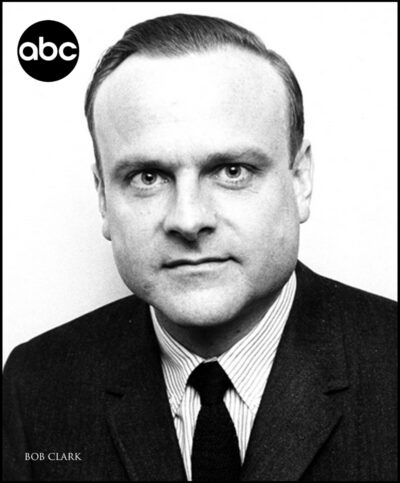 This recording isn’t just an artifact—it’s an audible time capsule. When Secretary of State Dean Rusk appeared on ABC’s Issues and Answers on July 8, 1962, he was doing more than answering questions; he was embodying the calculated candor of Cold War diplomacy in front of a national audience. This half-hour segment stands as one of the era’s clearest examples of how radio journalism helped shape public consciousness, using the airwaves as a stage for transparency and tension.
This recording isn’t just an artifact—it’s an audible time capsule. When Secretary of State Dean Rusk appeared on ABC’s Issues and Answers on July 8, 1962, he was doing more than answering questions; he was embodying the calculated candor of Cold War diplomacy in front of a national audience. This half-hour segment stands as one of the era’s clearest examples of how radio journalism helped shape public consciousness, using the airwaves as a stage for transparency and tension.
The episode’s timing amplifies its power. It aired during a fragile interlude between the erection of the Berlin Wall and the Cuban Missile Crisis—two of the Cold War’s defining events. As Rusk fielded questions about nuclear test bans, the Berlin deadlock, and potential aggression from Communist China, each answer echoed the high-stakes calculus of international relations. With nuclear testing negotiations inching forward and the world wary of missteps, his remarks were more than policy explanations—they were signals to both allies and adversaries.
Equally important is what this broadcast reveals about the media’s evolving role. ABC’s Issues and Answers, by prioritizing direct engagement with top officials, offered Americans a rare chance to witness diplomacy unfolding in near real time. There were no dramatized panels or partisan soundbites—just focused questions and sober answers. The presence of correspondents Bob Clark and John Scali lent additional gravitas, as their probing inquiries drew out tensions that most Americans only vaguely understood.
Rusk’s responses to Vietnam—highlighting discord and strategic unease—foreshadow the escalation to come. His comments on Berlin subtly expose the frozen nature of Soviet dialogue. And his posture toward the Sino-Indian dispute previews the global ramifications of Chinese expansionism. These aren’t just historical footnotes—they are pressure points that reveal the quiet turmoil beneath mid-1962 diplomacy.
Preserving this broadcast at the USA Radio Museum not only honors the program’s journalistic rigor but offers future generations a portal into an era where radio did more than inform—it steadied a nation against uncertainty.
The Journalists Behind the Microphones
Bob Clark & John Scali: Voices of Authority in a World on Edge
Bob Clark
A veteran journalist and ABC News stalwart, Bob Clark delivered political reporting with clarity and restraint. By the time of this 1962 Issues and Answers broadcast, Clark was already making his mark as a White House correspondent, known for his calm demeanor and precise questioning. He later became the only journalist present at both Kennedy assassinations, placing him at the heart of two defining moments in American history. His long tenure with Issues and Answers helped elevate the program’s reputation as a forum for serious, thoughtful political dialogue.
📄 Read Bob Clark’s obituary via Weise Funeral Home
John Scali
Diplomatic correspondent by day—Cold War intermediary by destiny. Just months after this broadcast, John Scali played a quiet but critical role in averting nuclear catastrophe. In October 1962, during the Cuban Missile Crisis, Scali became a secret liaison between Attorney General Robert Kennedy and Soviet envoy Aleksandr Fomin. Their back-channel negotiations—brokered over lunch at the Occidental Restaurant—formed the backbone of the final agreement: removal of Soviet missiles in Cuba in exchange for the withdrawal of U.S. Jupiter missiles from Turkey. Scali’s journalism didn’t just report history; it helped shape it.
📄 Read John Scali’s obituary via Wikipedia
A Legacy Signed Off: The Final Chapter of Issues and Answers
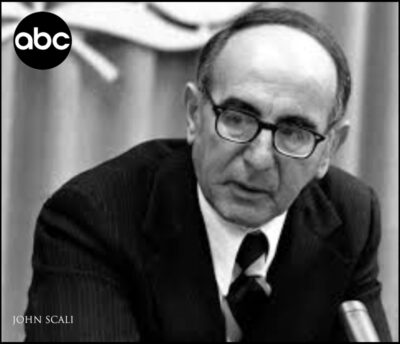 From its debut in 1960 through its final broadcast in 1981, Issues and Answers remained a cornerstone of ABC News’ commitment to public affairs programming. In an era defined by civil rights struggles, global conflicts, and shifting political tides, the program delivered weekly doses of clarity—inviting policymakers to speak candidly and inviting Americans to listen critically.
From its debut in 1960 through its final broadcast in 1981, Issues and Answers remained a cornerstone of ABC News’ commitment to public affairs programming. In an era defined by civil rights struggles, global conflicts, and shifting political tides, the program delivered weekly doses of clarity—inviting policymakers to speak candidly and inviting Americans to listen critically.
Its final episode aired on November 8, 1981, quietly closing the curtain on a 21-year run that shaped the Sunday news format we know today. The baton was passed to This Week with David Brinkley, a longer-format program that inherited its predecessor’s dedication to probing inquiry but expanded into more modern television conventions. Yet even as the stage evolved, Issues and Answers left behind a legacy of editorial discipline, uncompromising standards, and a format rooted in respect for the viewer’s intelligence.
The show’s enduring impact lives on in the voices it amplified—from cabinet officials like Dean Rusk to political thinkers and foreign leaders. Its insistence on journalistic rigor and its refusal to dilute discourse for entertainment made it a quiet rebel in the broadcast world—an outlier that never pandered but always informed.
To preserve even a single episode—as reflected here with the July 8, 1962 interview—is to keep alive a journalistic tradition that prioritized truth over theatrics. The USA Radio Museum’s dedication to capturing that moment reflects what Issues and Answers stood for: thoughtful broadcasting that helps a nation make sense of itself.
So we honor it now not with fanfare, but with gratitude. For every question asked behind those microphones, for every answer spoken with measured conviction, Issues and Answers gave the American public what it needed most—a reason to listen.
Curator’s Note
In commemorating ABC’s Issues and Answers and its July 1962 broadcast with Secretary of State Dean Rusk, we are reminded that journalists often stand just inches from history’s heartbeat. Both Bob Clark and John Scali exemplified a form of broadcast journalism that didn’t chase sensation—it pursued truth, proximity, and public understanding.
Clark’s dignified presence helped Americans make sense of political turmoil with clarity and calm. Scali’s diplomatic acumen transformed a reporter’s instinct into an act of global consequence during the Cuban Missile Crisis. Together, they represent the ideal that radio journalism could not only inform but intervene—bridging diplomacy, democracy, and human insight.
Their work, captured in this broadcast and amplified by the enduring legacy of Issues and Answers, reminds us that every question asked on air may echo into the world beyond it. Their microphones were not just props—they were conduits for history.
_____________________
A USARM Viewing Tip: On your PC? Mouse/click over each image for expanded views. On your mobile or tablet device? Finger-tap all the above images inside the post and stretch image across your device’s screen for LARGEST digitized view.

